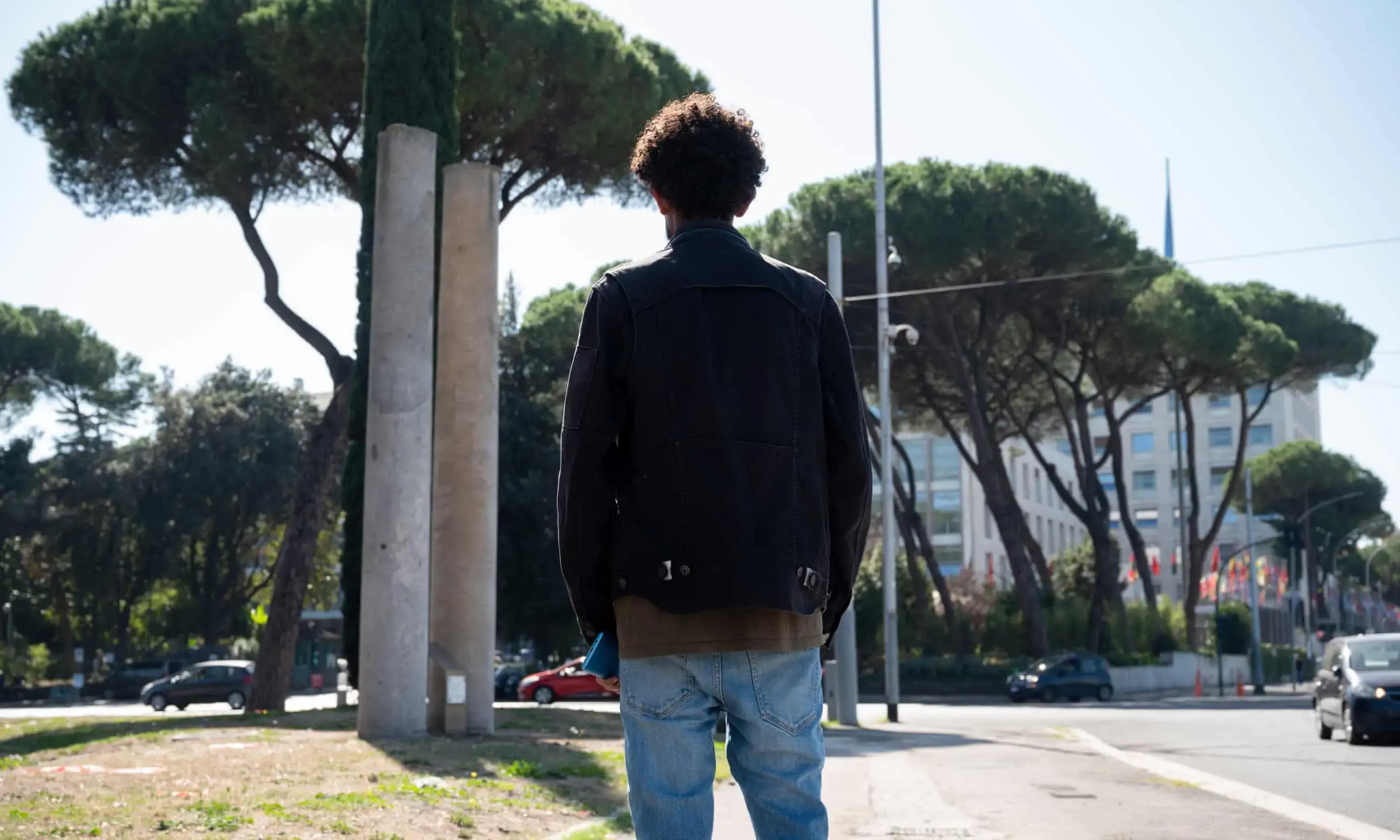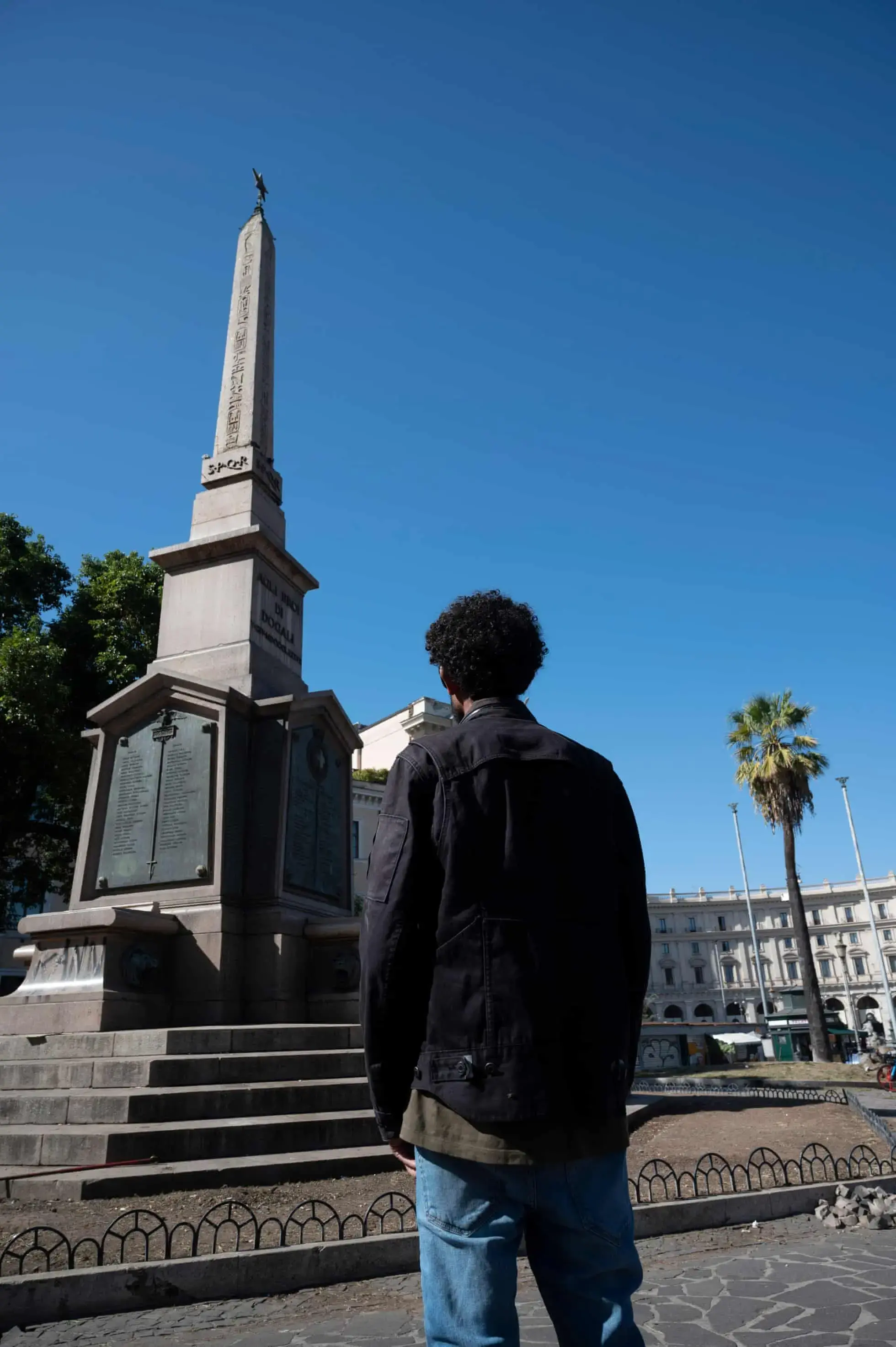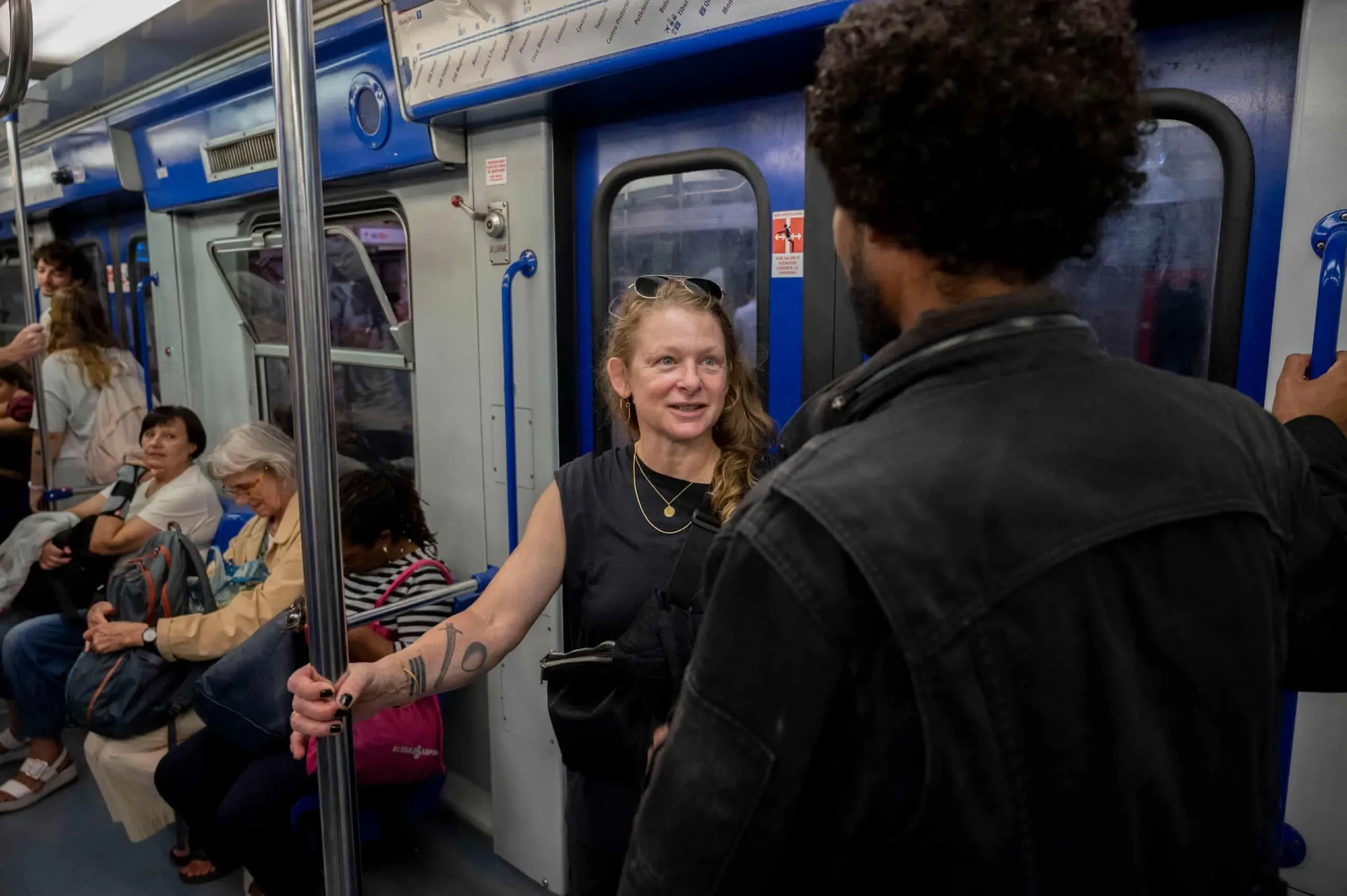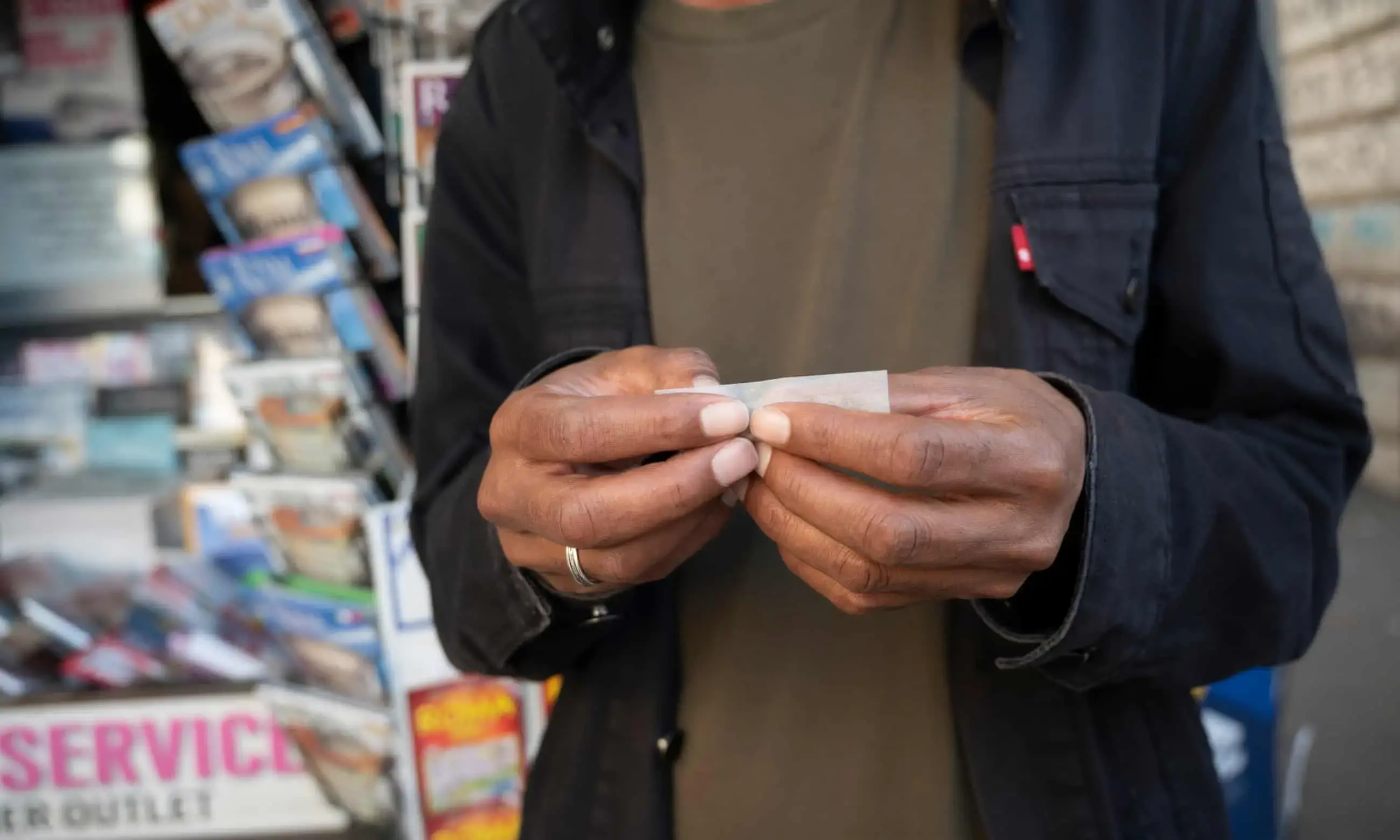
Fixers are the backbone of the western news industry, but they face a profound disparity in pay, recognition and safety. Zleke guided Ann Neumann through a war-torn Ethiopia — a country he soon had to flee, fearing for his life.
Zleke knew that he was being watched.
One day in the early summer of 2022, two men knocked on his door. They knew his name and carried pistols, though they wore plain clothes. They took his phone and his ID and told him to come with them. He didn’t resist.
Two men in military fatigues with AK-47s waited in the car outside. They drove him from his home on the outskirts of Addis Ababa to a prison house deep in Oromo territory. There was a mattress on the floor and little else. Zleke was kept away from the other detainees and the men holding him spoke only Oromo, a regional language, so he was unable to communicate with them. He was then moved to a second location, where he was interrogated, insulted and pushed around. After three weeks he was transported to a police station in Addis Ababa, where he was kept for another three weeks, without any way to contact his family.

As a nonprofit journalism organization, we depend on your support to fund more than 170 reporting projects every year on critical global and local issues. Donate any amount today to become a Pulitzer Center Champion and receive exclusive benefits!
Six weeks after his abduction, Zleke’s wife answered the door to find two men who asked for money for her husband’s release. She collected what she could and gave them 30,000 birr, about $535. They let him go with these words: “You can go now but you will never be free. We will keep eyes on you. We will never let you live here.”
After that, Zleke stayed inside his home, too afraid to go outside. Once he and his wife decided that he should leave Ethiopia, things went quickly. His passport would expire in less than a year. He had no time to waste.
Zleke worked with an Italian friend to get a visa for Italy.
I’m a journalist, and Zleke had been my fixer when I traveled to Ethiopia to write about the Tigray war, which lasted from November 2020 to November 2022. He helped me arrange interviews with sources, organized transport, and translated so that I could communicate with non-English speakers.
To protect his identity, and to protect the safety of his wife and children in Ethiopia, who are still awaiting visas, I am using a pseudonym he chose.
His detention unfolded only days after I left the country. We are still not sure exactly why, but we know that he and I were seen together, watched as we walked in his neighborhood. He fled Ethiopia to survive.
He wound up here, in a refugee camp on the outskirts of Rome, grieving the loss of his home, the distance from his wife and two children. He carries the plight of an African refugee in the west, tasked with making a new life far from anything familiar.
Together, we laughed and cried at the impossibility of the two of us being here together in Italy. We laughed and cried because Zleke was safe.
In February 2022, as I was planning my reporting trip to Ethiopia, a country then already mired in a bloody civil war, I contacted a film producer in my Brooklyn neighborhood who had recently completed a shoot there. She suggested a few translators to me. In exchange for the connections, I asked if she needed me to take anything to the people she knew in Ethiopia. “Let me check in with my friend Zleke and see if he needs anything. He’s in Addis,” she said. “He’s a fixer. He gets a little shy but he’s a wonderful person.”
A “fixer” is a local professional, sometimes a journalist, who works with foreign reporters. They cultivate sources, set up meetings, translate conversations and arrange travel. Fixers are the backbone of the western news industry, negotiating on-the-ground logistics and tasks for journalists who do not live locally and come to the continent to write about a specific issue.
In conflict zones, the fixer may take on the responsibility of keeping a journalist safe; they are better able to read the danger of a situation than a foreigner. Their work is absolutely vital to the American and western news ecosystem.
The disparity in pay, recognition and safety between journalists, who are predominantly white westerners, and fixers, who are usually local, can be profound.

Examples of this disparity characterized the American occupation of Afghanistan, which lasted from 2001 to 2021. On 4 March 2007, an Afghan fixer, Ajmal Nasqhbandi, and his colleague Daniele Mastrogiacomo, a reporter for the Italian newspaper La Repubblica, were captured during travel to interview Taliban leaders. Mastrogiacomo was released 15 days later, but 24-year-old Nasqhbandi was ultimately beheaded.
During the withdrawal of American troops from Afghanistan in August 2021, as I was pitching my article about the war in Ethiopia, the news was awash in reports of the frenzied efforts of western journalists to arrange evacuation from Kabul for the fixers and interpreters they had worked with.
More than 80 local journalists were killed during the 20-year war.
My piece, which had been commissioned by Harper’s magazine, focused on the consequences of the war between the Ethiopian federal government and the Tigrayan government, which administered the northernmost state of the country. For a period of months, Tigrayan troops had successfully moved south toward Addis Ababa, before being pushed back into Tigray.
Civilians caught up in the fighting were often displaced or endangered, their homes ransacked, the women raped, the men killed or recruited to fight.
Zleke and I agreed that we would get nowhere near the active fighting, reporting only in areas the war had passed through — places already ravaged by conflict but out of Tigrayan hands.
We knew the risks. Local journalists had been detained by the Ethiopian government since the start of the war. Many international reporters had been deported. I would enter Ethiopia on a tourist visa, hoping to evade government attention.
I also knew that I was replicating a problematic paradigm of western newsmaking: a white reporter who parachutes on to the continent, potentially missing the context of a story while misinterpreting local culture, reporting a conflict through western, post-colonial eyes.
And yet, little comprehensive reporting about the war was reaching the US, where the Ethiopian diaspora exceeds 400,000, their country of origin the recipient of more than $2bn in aid a year, more than any other country on the African continent. I had recently begun work on a book in part about American foreign policy in Ethiopia, and early reports of the war’s gross atrocities compelled me to bring awareness of it to US readers.
I first stopped in Cairo, where I interviewed refugees from Ethiopia and its northern neighbor, the authoritarian country of Eritrea. A large refugee community resides in Egypt’s capital, desperate to get out of the Horn of Africa, hoping to find a way to Europe.
One man I spoke with had arrived in Mai Kadra, a town on the border of the contested region of Tigray, only hours after a massacre. Hundreds of civilians — including his friends and family members — had been cut down with machetes. The man had fled to Khartoum, then Cairo, paying a smuggler for transportation.
One Eritrean woman I interviewed had been raped by her smuggler outside Khartoum because she had no more money to pay him. After our interview, she crawled across the floor on her hands and knees and vomited into a trash can.
My interpreter there, a young Eritrean man with passable English, knew most of the expat community in his Cairo neighborhood. During his escape, he told me, he had taken a car through Sudan, driven recklessly by smugglers. When it crashed along a road, he said, the young woman who had been sitting next to him died in his lap.
Yet all of them had made it out. Now they were surviving in a country where work was hard to find, and abuse at the hands of their Egyptian neighbors was unavoidable. Tensions between Ethiopia and Egypt are high, in part because Ethiopia has built a dam on the Nile, which begins in the Amhara region. Egyptians feel threatened by this control of the river they rely on for 85% of their water.
The Ethiopians and Eritreans, whose countries were one until 1991, told me they were generally looked down upon because they are darker-skinned Africans. Stories like this exist across the African continent: refugees who flee their homes because of famine, unlivable economic conditions, or war are then trafficked like a commodity along trade routes, never to return to their homes and families again.
From Cairo I flew to Addis Ababa, the capital of Ethiopia. I met Zleke in front of the Red Terror Martyrs’ Memorial Museum, which commemorates the victims of the 1974 overthrow of Ethiopia’s last emperor, Haile Selassie. He was 40, though he looked much younger, tall and wiry. He was wearing a brown and gray sweatsuit and running shoes. We quickly warmed to one another.
The docents at the museum are all survivors of the Red Terror – there’s a room in the back of the museum full of bones. As they show you through the rooms, the docents tell their story to visitors: in the wake of Selassie’s overthrow, chaos allowed a military regime called the Derg to take power. The college students and other activists who had diligently worked to end imperial power were rounded up by the military, tortured or killed.
The next day Zleke and I flew to Lalibela, one of the country’s most holy sites and a popular tourist destination. Lalibela survives on a tourist economy, but the war had halted it altogether. I was one of only a handful of white westerners in the town, the others mostly aid workers.
Everywhere, the destruction of the war was evident. The airport had been ransacked, along with several local tourist hotels. Lalibela, after five months of occupation by Tigrayan forces, was still without water and electricity three months after liberation by federal troops.
We interviewed those who had witnessed the killings of civilians, those who were hungry after troops procured their food and water at gunpoint. Soldiers took everything they could from Lalibela’s residents, including phones, solar panels, pots and pans.
We spoke with women who had been raped by soldiers and were now afraid of disease. Researchers believe that 15% of the hundreds of thousands of women raped in the war have contracted HIV. Traumatized, injured and sick, these women are often accused of being traitors or collaborating with their rapists, although a kind priest was sheltering a few.
It was heartbreaking work, but Zleke and I worked well together, sharing our insights and personal details as we recovered between interviews. We talked about our partners and our families. When Zleke Skyped with his wife, back in Addis, he often pulled me into the frame to say hello. The horror we heard from the people in Lalibela made us immediately close.
On our second day, we were tipped off about a training of 200 new recruits by the Fano, an Amhara paramilitary group. As children sang songs of spring and resurrection in the churches, we stood on a soccer field with soldiers in camouflage who showed volunteers, young and old, male and female, how to clean Kalashnikov rifles and march in unison.
Because Zleke is Amhara, the troops welcomed us as observers. They were eager to answer our questions; they wanted international support and sympathy for their cause: the liberation of Amhara from what they saw as Tigrayan oppression.
By the time the war ended a year later, more than half a million people had been killed or had died from famine, more than 5 million were displaced, millions more faced starvation from drought and untended crops, and hundreds of thousands of women had been sexually assaulted or raped.
No military force on any side was innocent of heinous crimes against civilians, but the people of the Tigrayan state had been tragically, incomprehensibly laid to waste by the military powers of their federal government.
When I returned to New York, I immersed myself in the work of culling our notes and interviews. For six weeks I did not hear from Zleke, despite my increasingly frantic messages to his WhatsApp.
Finally, I messaged the documentary film-maker who had initially put us in touch. “He is in Italy with our friend,” she wrote back, “He sought asylum there (it actually is a wild story and the universe is kind).”
The next morning, Zleke called me from a new phone number. He was in Rome and apologized for not calling sooner. He had been detained by a group of Oromo militants after I left Ethiopia. In addition to the conflict with Tigray, the Ethiopian administration was suppressing protests and conflicts with groups in other states. The Oromo, whose territory is being encroached upon by the growing size of the capital, have resorted to military force to prevent what they see as the theft of their land.
Zleke was lucky to have a friend in Rome. She helped him find a lawyer and he began the byzantine process of applying for asylum. We spent the following months putting together a packet of information that detailed his role in my reporting.
It took three months for him to be moved to the refugee center, but that summer, he received asylum. On the phone we laughed with joy and disbelief at how quickly it had been granted. The war with Tigray had ended but the Ethiopian government had turned on the Fano, its former allies. Fano members we had interviewed in Lalibela had been killed, jailed or disappeared. And the Ethiopian government had ceased issuing passports, so Zleke’s wife and children were unable to join him in Rome.
Zleke continues to live in the refugee camp. I am obscuring details about the facility where he lives; he fears that his family in Ethiopia will be in danger if his identity is known.
Last October, I flew to Rome to see Zleke, to check on his wellbeing, and to learn about his flight from Addis Ababa. I stayed in a pensione only a few hundred yards from the refugee facility where he lives alongside 600 other Africans, most of whom will wait for asylum for years, if they have any chance at all. Some will be deported to their home countries and an uncertain fate; others, if current negotiations are successful, will be sent to a third country such as Albania.
We met in the street and embraced. He had endured so much since we had last been together. He was lean. He had just come from a night shift at a tourist hotel in the city and was tired. He wore blue pants the hotel owner had bought him. A new scar adorned his forehead.

The neighborhood where the facility is located is suburban, with narrow two-lane roads and trees, but no sidewalks. The refugees have worn walking paths in the roadside dirt to and from the facility. The tension between them and local people is palpable. When Zleke and I walked anywhere, we were closely observed by passersby.
“The Italians,” he told me, “they try.”
Zleke feels lucky to have his own room; many others share a single with their family members or other countrymen. His is adequate but dirty, with a small toilet that has no seat or lid and a grimy sink. He bought a small refrigerator from another refugee in the camp.
His closest friend in the facility is from Chad, a former soldier with a handsome face. He is quiet, knowing little English or Italian. He came by boat from Libya. It cost about $300, he tells me. He has already been deported from Belgium and the Netherlands (no one I meet wants to stay in Italy, where the government is perceived to be punitive while other governments can be imagined as more accepting).
Zleke tells me that most of the residents arrived via boat across the Mediterranean, their transport arranged by smugglers. We’ve all seen images of these boats, piled high with desperate, hungry Black bodies, the objects of pity, politics and disdain. These boats change lives if they reach their destinations, and take lives if they don’t.
Back in Addis Ababa, Zleke’s wife and two children waited for months for a text message from the Ethiopian administration that told them they could pick up their passports. They are still waiting for their Italian visas, but when they receive them, an Italian organization will pay for their flights to Rome.
Zleke talks to his family on the phone every day. “I want them to be here, to learn Italian — they’ve already begun learning!” he tells me. When they arrive, Zleke and his wife will have to find housing, but he is happy to deal with that when they get here.
“I don’t want to be rich, I don’t want to go to America,” Zleke tells me. “I never had any dream to come here. But I love my decision, even if unfortunate.”
He has worked with enough westerners to realize that the stories of the west’s greatness are leavened by myths that entice those on his continent to seek a “better future.”
As we sit on the linoleum floor of his little room in the refugee facility drinking coffee, he cries with homesickness. He will not see his country or his parents and siblings there for at least five years because of travel restrictions on new Italian citizens.
A hotel in Rome gives Zleke hours that no one else wants, the night-time shifts when it is mostly quiet, when tourists come in from late flights with red eyes and wanderlust. It pays him 50 euros for eight hours of work.

Another hotel gives him shifts when they can, but it takes an hour and a half to travel from the refugee facility to the hotels in the city. Transportation costs money; it’s yet another obstacle for the refugees in the camp looking for work.
During my visit, Zleke is my fixer again, ordering pizza for us from the Italian waiter, navigating the streets of this new country with agility. His professionalism masks the disorientation, depression and grief he is still experiencing in a new culture.
Back in New York, I read a draft of this article to Zleke over the phone to ensure that no detail will reveal his identity, that his wife and children in Addis Ababa can’t be found out.
I trusted Zleke with my life, now he trusts me with his — and the lives of his wife and children. When I fuss over a detail, uncertain if it will identify him, he tells me, as if he is telling himself, “Everything will be OK, don’t worry.”









